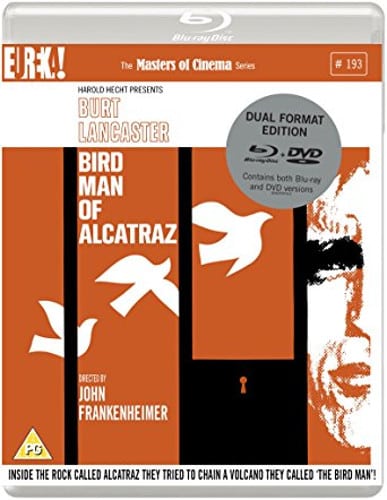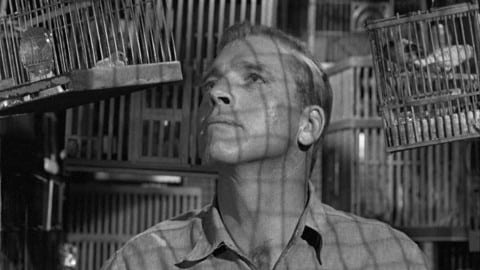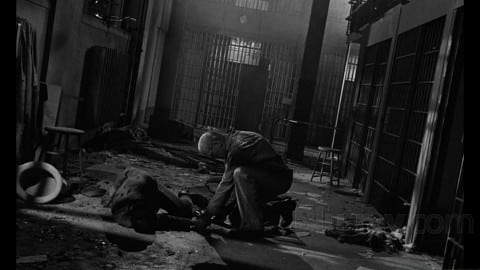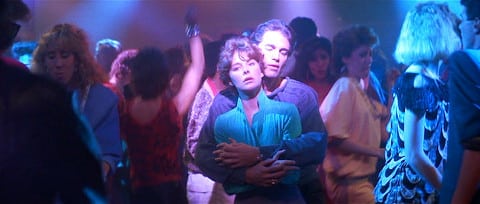Birdman of Alcatraz (1962)
Directed by: John Frankenheimer
Written by: Guy Trosper, Thomas E. Gaddis
Starring: Burt Lancaster, Karl Malden, Neville Brand, Thelma Ritter
USA
AVAILABLE ON DUAL FORMAT BLU-RAY AND DVD: 6TH AUGUST, from EUREKA ENTERTAINMENT
RUNNING TIME: 147 min
REVIEWED BY: Dr Lenera, Official HCF Critic
Robert Stroud is sent to Leavenworth Prison for committing a murder in Alaska. His rebellious attitude puts him in conflict with Harvey Shoemaker the warden. When he learns that his mother tried to visit him but was denied and told to return later in the week, his anger causes him to attack a guard and stabs him to death. Stroud is sentenced to death, but his mother runs a successful campaign and this is changed to life imprisonment in solitary confinement. To break the monotony, Stroud adopts an orphaned baby sparrow as a pet – something which starts a trend.…
It’s really quite odd how so many films set in prisons make for fascinating, gripping watches. Okay, you can incorporate tried and tested themes that invariably get the viewer involved, such as dehumanisation, an individual’s right [or not] for freedom, and so forth. But on the other hand things like spending so much time in one room with one character, and the protagonists continually being allowed to do very little, perhaps ought to result in boredom unless the film is in very clever hands. But we all know that the opposite is true, so much so that even a poor prison film tends to work on some level. I’m continually in debate with myself whether Papillon or The Shawshank Redemption is top of the list for me [the latter probably being the more obvious choice for many], but there were times during Birdman Of Alcatraz [which despite knowing a bit about the real events that inspired it I’d never seen before, though being a Clint Eastwood fan I’ve watched his very fine Escape From Alcatraz quite a few times] when I felt like it gave those films serious competition. It manages to be both an intriguing character study, and a tale of redemption that may uplift at times but which holds back from sappiness and easy sentiment, while it’s also quietly gripping through about three quarters of its lengthy running time. It asks some important questions. However, it’s also a rather dishonest and overly ‘safe’ film that significantly alters its real life main character for easier audience consumption and to make more easily its attack on the penal system. How much that influences one’s impression of the film probably varies from person to person, but I do think it helps to get a wider picture, how ever much you admire the filmmaking or what to me is now my favourite Burt Lancaster performance after Atlantic City.
Lancaster was forced by United Artists to make four films for $150,000 a picture in the 1960’s, rather than his normal fee of $750,000, because of cost overruns at his production company, Hecht-Hill-Lancaster, for which he was personally responsible. One of these was Birdman Of Alcatraz, which was adapted by Guy Trosper from the 1955 book by Thomas E. Gaddis. Charles Crichton was the original director until he clashed with Lancaster and was replaced by John Frankenheimer who’d previously tried to make this for TV. He re-shot all of Crichton’s footage. Actor Strother Martin bailed out of loyalty to Crichton and was replaced by Leo Penn – who was eventually cut out of the picture entirely. Cinematographer John Alton was also fired and replaced by Burnett Guffey. It seems that Lancaster liked to be in control, at one point physically picking up the director up and carrying him across the room during an argument about camera placement. After seeing a first assembly that ran over four hours, Frankenheimer and Trosper re-scripted and re-shot the film’s entire first third, condensing the story to a reasonable length. I have a feeling that the rather intrusive narration in parts of the first third was something that was added to paper over cuts. Nominated for four Academy Awards, it was also a hit which may seem rather surprising for a film that probably seems pretty un-commercial for today. It re-ignited the debate about the usefulness of prisons and Lancaster even met Stroud and campaigned for his release, though to no avail.
Birdman Of Alcatraz is framed by Gaddis awaiting the moving of the elderly Stroud after 17 years at Alcatraz to the Medical Center for Federal Prisoners in Springfield, Missouri. The younger Stroud is first introduced smashing open a window so he and his fellow prisoners can get some fresh air and stop sweating so much while they’re being transported to Leavenworth Prison. We immediately get an idea of his rebellious nature, and also learn that he killed someone who attacked a prostitute friend of his. The screenplay neglects to mention that it was while Stroud was actually the woman’s pimp, but more on that kind of thing later. Because of his window breaking, Stroud gets his privileges suspended for the first 30 days of his nine year sentence, and thereby becomes a thorn in the side of warden Harvey Shoemaker for much of both their lives. The conflict between warden and prisoner has always been one of the most entertaining aspect of prison films, and here Lancaster and an excellent Karl Malden get to face off several times in scenes brimming with tension though tempers rarely flare. This warden does everything by the book [to a fault], though much later on we learn that he even played a prominent part in prison reform. Being as he spends much of his time in solitary confinement after killing a guard, Stroud’s other main relationships in prison are with neighbour Feto Gomez played by Telly Savalas with hair, and guard Bull Ransom. You know that Stroud’s hostile attitude will eventually warm and that he will learn politeness [for a while he just doesn’t seem to know how to be nice because he’s spent so much time on his own] and become friends with these two, though sentimentality is limited even though one feels like cheering the first time he thanks Ransom for all he’s done for him. And then there’s Elizabeth his mother, with whom he’s extremely close. You probably won’t be able to figure her out entirely, which may have been the intention. Is her jealousy over Stroud getting married in prison due to protectiveness, or darker reasons?
The first major step in Stroud’s rehabilitation is when he adopts a baby sparrow. Soon he’s crushing every insect he can find in his increasingly filthy cell to feed it, giving it a home in his hat, and building him a cage. Building him a cage you ask, is that possible with what little he owns? Well, most things are a lot more possible to do if you have virtually all the time in the world. Eventually Stroud builds up a collection of birds and cages, then through trial and error comes up with a cure when they fall ill. As the years pass, he becomes an expert on bird diseases and even publishes a book on the subject. Then he meets bird-lover Stella Johnson and agrees to go into business marketing his bird remedies, but of course the authorities will only take so much and Alcatraz eventually becomes his new home. Despite finishing with a somewhat fictionalised depiction of the Alcatraz rebellion in 1946, action is minimalised. For much of the time we’re just watching one man and his birds, and it’s really pretty absorbing, especially when you consider that they would have had to train all these birds. Today’s filmmakers have it all so easy what with all the CGI they can use. And then there’s Lancaster’s carefully modulated performance, far calmer than his usual physicality, which is aided by way above average, subtly evolving, old age makeup, though the final 40 minutes or so does outstay its welcome a little and threatens to drag though doesn’t quite achieve that.
Strong performances are everywhere – I haven’t yet mentioned Betty Field as Stella. The script seems undecided as to whether she actually loves Stroud or whether she sees him more as a cause and a business partner, but Field certainly seems to be sure and she may break your heart in her final scene. For much of the time Frankenheimer keeps the unavoidably static story slowly but steadily moving along, with lots of montages set to Elmer Bernstein’s music which manages to evoke the birds on view without going into full Disney-style musical depiction. Sometimes the images blur a bit longer into each other, such as when a close-up of Stroud’s eyes remain in the next shot of Stroud sitting against a wall. Frankenheimer is already using deep focus shots, titled angles and his favourite device of having one character’s face in close-up on one side of the screen. Things such as sunlight illuminating Stroud’s face when he’s told some good news are hardly new, but cinematographer Burnett Guffey takes every opportunity possible to make dark rooms and prison bars visually interesting, even diversifying the look to help maintain interest. This is one film that would never have looked as good in colour and ought to he held up of an example of how effective black and white photography can be.
So why, despite all the praise I’ve given it, did I feel a little uneasy after watching Birdman Of Alcatraz? Well, one can perhaps understand how a 1962 film would avoid mentioning things like the main reason for Stroud to be continually denied parole being that he was “a predatory homosexual”, while slightly corny moments like Stroud talking about the value of life as he tries to treat someone get us to think about things such as how we waste much of our lives. The script’s criticism of prison as something which takes away dignity and often doesn’t help offenders may be at least partly valid, and it’s quite possible that Stroud being partly defined by refusing to lie is accurate. But turning Stroud into a person who doesn’t seem to have any business being in a prison at all despite what he did, and into a poster boy for extensive reforms [thereby influencing public opinion by fiction] seems rather crass and fraudalent, and I wish that the filmmakers had had the courage to depict Stroud as the very unpleasant person he apparently was throughout his life. A doctor proclaims that Stroud should be freed to conduct medical research for humans, but we’re not asked to even consider the police and indeed government view on the matter, something we may have done if we’d been shown Stroud’s other violent actions. But despite leaving a slight bad taste in my mouth, Birdman Of Alcatraz still works very well as a movie, and for many that will be enough!
Birdman From Alcatraz comes to Blu-ray in a very good if not quite great transfer which seems to be the same one used for the two Region ‘A’ releases from Twilight Time and Olive Films. For much of the time it looks very sharp and clean but some scenes have some minor fluctuations and slight grain clustering. It’s not at all a major issue though.
Eureka have included the audio commentary from the Twilight Time though not the one from the Olive Films, and added two featurettes. The commentary features usual Twilight Time stalwarts Nick Redman and Julie Kirgo, plus historian and editor Paul Seydor, and they never stop talking which is quite a feat considering the film’s length. They chat quite a bit about the real Stroud and the things the movie invented, point out many things, and several times moan how modern films aren’t as good. It’s easy to think of them as being fuddy duddies for saying that, but any look at the films of 1962 would point out far more diversity than you get now, and I’m not sure Birdman Of Alcatraz would even get made in today’s world, at least by a major studio intending it as a commercial release. Seydor is slightly more critical of the film and has a friendly argument with Kirgo when he says it doesn’t show enough transformation. Overall it’s a typically warm and relaxing Twilight Time track jampacked with more information than usual.
Made in 2015 but only released, the 28 minute Illusion Of Freedom has the film’s camera operator Richard H. Kline discuss its background and shooting. Much of this information is on the commentary, but Kline goes into more detail about certain things, such as the considerable conflict [to which Lancaster tended to have the last word] of ideas going on. The 36 minute interview with critic Sheldon Hall covers similar ground, but tells us much more stuff about the real Stroud [including a rather unpleasant revelation I didn’t actually know], as well as saying how James Lee Berret the Director of the Federal Bureau of Prisons prevented four previous attempts to film Stroud’s story. The editing and Lancaster’s performance is also discussed. Pretty comprehensive.
I may have my issues with the execution of Stroud’s story, though for many viewers that won’t be a problem. The Birdman Of Alcatraz is still thoroughly riveting cinema of a kind you don’t get much now, so the Doc recommends!
DETAILS
*1080p presentation of the film on Blu-ray, with a progressive encode on the DVD.
*LPCM mono soundtrack (Uncompressed on the Blu-ray)
*Optional English subtitles for the deaf and hard-of-hearing
*Audio commentary with film historian and editor Paul Seydor, moderated by Twilight Time’s Julie Kirgo and Nick Redman
*Illusion of Freedom: Richard H. Kline on John Frankenheimer’s “Birdman of Alcatraz” (29 mins) – a new video piece on the film
*An exclusive new video interview with film historian Sheldon Hall
*Original theatrical trailer
*A collector’s booklet featuring new writing on the film by Travis Crawford, as well as a selection of archival imagery from the film’s production











Be the first to comment